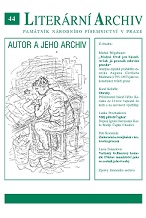Psaní mezi útěkem a intoxikací Svědectví rukopisů Ladislava Klímy
Writing between escape and intoxication The testimony of the manuscripts of Ladislav Klíma
Author(s): Mateusz ChmurskiSubject(s): Literary Texts
Published by: Památník národního písemnictví
Keywords: life testimony; diary series; cursed poet; autobiographical genres; tautology; symmetry in spiritual life; suicide; author’s self-definition
Summary/Abstract: The first part of the study is concerned with the rhythm of the reception of Klíma’s work: from the anniversary of his death, through the “Golden Sixties” and his cult in the underground to present-day editions. The second part of the study takes the brief example of two versions of the story Řeč oblohy (“Language of Sky”) to analyse the visual rhetoric of Klíma’s poetics and the importance of his diaries. Writing diaries is here interpreted after Philippe Lejeune as an anthropologicallly conceived practice. Multilingualism and typography enable us to examine the function of the raster of Klíma’s poetics of composition (as conceived by Boris Uspensky). Here it is possible to define its three “rules” (apparent equivalence, “ontological” initial letter and visual hierarchization) and to show the most conspicuous feature of Klíma’s texts – neologization or, more precisely, “tautologization” of the philosophical terminology. All of the strategies serve the same purpose: to keep the distance between the life and viewpoints of the author and others. What is more, comparison of the two versions enables us to expose the common autobiographical basis of Klíma’s philosophical and literary work. The polyphonic composition of the texts becomes a labyrinth which is built by the author for himself. The world which ought to be consciousness, turns into nothing. Besides, strictly diaristic (chronological) and auto-referential entries can be understood as a form of constant returns to the first meeting of oneself as an author (in other words, as a diaristic pact). On this occasion, it is possible to emphasize the importance of meteorology for Klíma’s work. In this way fragments of destroyed verbal philosophy, this desperate struggle with the world with all its outdated thought (and especially outdated speech), participates in creating the melancholic beauty of his prose. And in the end the symmetrical development of the diaries and Velký román (“Great Novel”) enables us to observe mutual supplementing against the background of the traumatic recollection of the writer’s attempts at suicide. Indeed, the rhythm of the diary entries is a repetition of the above-mentioned reflections on suicide, of the Great Novel and of numerous heroic models. When understanding Klíma’s aim as an attempt to express in literature the existential situation of an individual on the margins of society, then the “illogical logic” gains a sense of profundity as the answer to modern alienation. Klíma’s Diaries sound like “drafts of his life”, or rather “a life in drafts”.
Journal: Literární archiv
- Issue Year: 2012
- Issue No: 44
- Page Range: 29-55
- Page Count: 27
- Language: Czech

